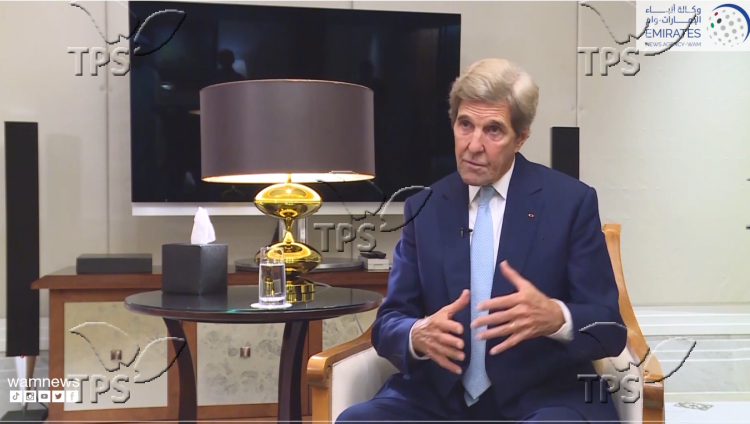US Seeks Developing World’s Support in ‘Battle’ of Reforming IMF, World Bank: John Kerry
Jerusalem, 10 October, 2022 (TPS-IL) -- ABU DHABI, 10th October, 2022 (WAM)
John F. Kerry, U.S. Presidential Envoy for Climate, who has been advocating reforms to the multilateral financial institutions such as the International Monetary Fund (IMF) and the World Bank, has sought the developing world’s support in his “battle”.
In an exclusive interview with Emirates News Agency (WAM) in Abu Dhabi, Kerry, who was the 68th United States Secretary of State, pointed out that the multilateral development banks have always been a key to the ability of many countries to afford new technology or investment.
“And the development banks, frankly, need to be doing more, and it is we, the shareholders, who need to empower them to do more. So, we need to give the banks new rules, new ability, in this new world we are living in, to be able to be of more assistance to less developed countries,” he explained.
“And the developing world, I hope, will step up and help us win this battle of reforming the development banks. So that we can make them more effective,” Kerry stressed.
Impact of global economic slowdown
The U.S. Presidential Envoy, who was on a visit to attend Sustainability Summit organized by the Economist, and the One Planet Sovereign Wealth Fund summit in Abu Dhabi on Thursday, said, “It is great to be in the UAE and we appreciate enormously all of the contributions that the UAE is making to these processes [climate actions] and their leadership.”
Asked about the impact of a global economic slowdown on funds to fight climate change and investments in renewable energy and climate tech, Kerry said, “That’s a very good question but I don’t think anybody knows it completely. But probably there will be some negative impact on funding for climate because the countries are feeling enormous pressure on the cost of fuel.”
He added that the global pandemic and conflict in Europe have further complicated the situation. “We hope it won’t be too big an impact. Because it [climate change] is an enormous threat to everybody in the world if we don’t do the things that are required to reduce emissions and deploy clean energy and new energy for the new economy.”
Recession and $4 trillion investments for climate transition
Asked whether he is confident about meeting the targeted $4triilion annual investments for net-zero transition globally, the top diplomat said, “No, I am not convinced that, that target can be met. I think it is a big challenge, but I think if we work at it, we can accelerate the availability of funding. And we can also see other countries beginning to step up and be helpful in this process. But it is not going to be easy. We have a huge deficit, a huge gap in the amount of money that is needed.”
Still, he expressed his hope that countries will begin to put developmental money on the table in order to create more bankable deals so that the big finance globally can come to the table and be helpful. “But that money needs some element of ‘derisking’ – of making it less risky for other people to invest. And that’s the key right now. We’re going to need a lot of investment in order to affect this transition,” the climate envoy explained.
Lessons learned from COVID
The biggest lesson learned from the global pandemic, according to Kerry, is “we all are dependent on each other, and we need to cooperate very quickly, very early on any kind of challenge, particularly a health challenge that spans the world. We really need to recognize the world is a very small place today.”
He added that it is also critical that the developed world shares with the developing world “when we have something like a vaccine breakthrough or other things. It is important that we have justice and fairness in the process of addressing these kinds of crises.”
John F. Kerry was sworn in on 20th January 2021, as the United States’ first Special Presidential Envoy for Climate and the first-ever principal to sit on the National Security Council entirely dedicated to climate change.


